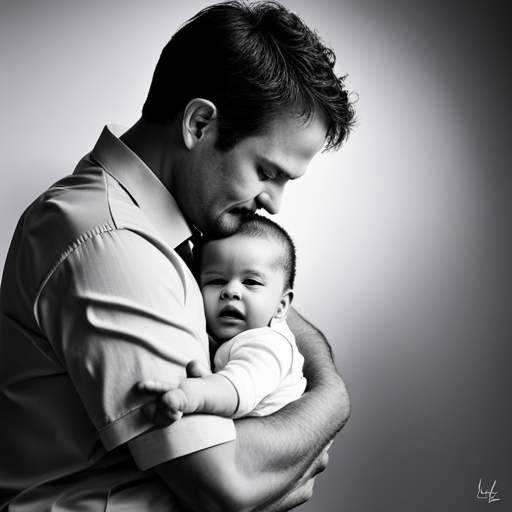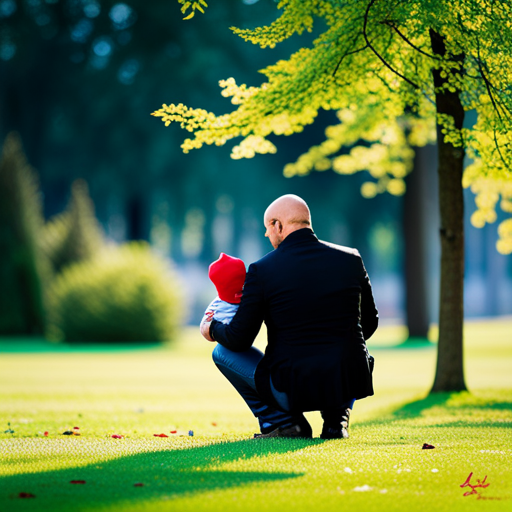"Cherishing Little Steps - A Haven for Baby and Family Journeys"
Fatherhood’s Impact on Baby
Are you ready to embark on the incredible journey of fatherhood? Brace yourself, for your role as a father has a profound impact on your baby’s life.
As you step into this role, you will be amazed at the emotional bond and attachment that develops between you and your little one. Through your active involvement, you will contribute to their cognitive development, language acquisition, and socialization skills. Your presence will nurture their self-esteem, physical health, and problem-solving abilities.
Moreover, as you guide them through life’s challenges, you will help them develop emotional regulation and coping skills. Remember, the impact you have on your baby’s life extends far beyond their early years, shaping their future relationships.
So, embrace the joys and responsibilities of fatherhood, knowing that your love and guidance will leave a lasting imprint on your precious child.
Emotional Bond and Attachment

When you become a father, your emotional bond and attachment to your baby is crucial in fostering their development and well-being. Building a strong emotional connection with your little one provides them with a sense of emotional security, which is essential for their overall growth and happiness. This emotional bond forms the foundation of their attachment to you, as well as their understanding of relationships and trust in the world.
Attachment theory, developed by psychologist John Bowlby, emphasizes the importance of a secure attachment between a caregiver and a child. As a father, your role in establishing this secure attachment is significant. Your presence, love, and support create a safe and nurturing environment for your baby, helping them feel secure and loved. This emotional security serves as a protective factor against stress and adversity, promoting their emotional and cognitive development.
By actively engaging with your baby through play, cuddling, and responding to their needs, you’re reinforcing the emotional bond between you. Your affection and attention teach your baby that they’re valued and loved, building their self-esteem and confidence. This emotional connection also lays the groundwork for healthy social and emotional relationships as they grow older.
Cognitive Development and Learning

By actively engaging with your baby’s cognitive development and learning, you can have a profound impact on their intellectual growth. As a father, you play a crucial role in shaping your baby’s cognitive abilities and fostering a love for learning. Here are five key ways you can support your baby’s cognitive development:
-
Stimulate their curiosity: Encourage your baby to explore the world around them through sensory play, interactive toys, and engaging activities. This helps develop their cognitive flexibility, allowing them to adapt to new situations and think creatively.
-
Engage in interactive conversations: Talking to your baby and responding to their babbling helps develop their language skills and enhances their executive functions, such as problem-solving and decision-making.
-
Read together: Reading to your baby from an early age helps develop their language and comprehension skills. It also introduces them to new concepts and stimulates their imagination.
-
Play games that promote problem-solving: Engage in age-appropriate puzzles, shape-sorting activities, and building blocks. These activities enhance your baby’s cognitive skills, including their ability to plan, organize, and think critically.
-
Encourage independent exploration: Provide a safe and stimulating environment for your baby to explore independently. This fosters their independence, curiosity, and cognitive growth.
Language Acquisition and Communication Skills

Your active involvement as a father plays a crucial role in nurturing your baby’s language acquisition and communication skills. Babies are born with an innate ability to learn language, but it is through interaction and exposure that they develop their skills. By engaging with your baby and providing a rich language environment, you can help them progress through the babbling stages and reach important milestones in their language development.
Language development theories suggest that babies go through various stages of babbling before they start producing words. These stages include reflexive, cooing, babbling, and jargon. During the reflexive stage, your baby will produce random sounds and cries. As they enter the cooing stage, their sounds become more intentional and melodic. The babbling stage is characterized by the repetition of consonant-vowel combinations, such as "ba-ba" or "da-da." Finally, in the jargon stage, your baby will experiment with intonation and rhythm, mimicking adult speech patterns.
To give you a better understanding, here’s a table summarizing the babbling stages:
| Stage | Description |
|---|---|
| Reflexive | Random sounds and cries |
| Cooing | Intentional and melodic sounds |
| Babbling | Repetition of consonant-vowel combinations |
| Jargon | Experimentation with intonation and rhythm, mimicking adult speech patterns |
Socialization and Interaction With Others

To promote your baby’s socialization and interaction with others, actively engage in shared activities and encourage their participation. Building strong peer relationships is essential for your baby’s social skills development. Here are some ways you can help your little one thrive in their interactions with others:
-
Arrange playdates: Organize playdates with other children of similar age. This will give your baby the opportunity to interact, share toys, and learn important social skills like taking turns and sharing.
-
Attend parent-child classes: Enroll in parent-child classes like music, art, or baby gym. These classes provide a structured and supportive environment for your baby to engage with other children and learn how to interact in a group setting.
-
Encourage parallel play: During playtime, encourage your baby to play alongside other children. While they may not actively engage with each other, this type of play helps develop social awareness and fosters a sense of companionship.
-
Model positive behavior: Your baby learns by observing you. Be a positive role model by displaying kindness, empathy, and good manners in your interactions with others. Show them how to share, take turns, and communicate effectively.
-
Provide opportunities for socializing: Take your baby to parks, playgrounds, and community events where they can interact with children of all ages. These experiences will help them develop important social skills and build confidence in their ability to connect with others.
Self-Esteem and Confidence Building

Building your baby’s self-esteem and confidence is crucial for their overall development and well-being. As a father, you have a significant role in shaping your child’s self-perception and belief in their abilities. By providing positive reinforcement, support, and encouragement, you can help your baby develop a strong sense of self-worth and resilience.
One effective way to build your baby’s self-esteem is through positive role modeling. Children learn by observing, so demonstrate confidence, self-expression, and problem-solving skills in your own actions. Show them that it’s okay to make mistakes and learn from them, promoting a growth mindset that encourages continuous improvement.
Fostering independence is another important aspect of building self-esteem. Encourage your baby to explore their environment, allowing them to tackle age-appropriate challenges and make decisions. This autonomy helps them develop problem-solving skills and a sense of accomplishment.
Promoting self-expression is also vital. Encourage your baby to communicate their feelings and thoughts, reinforcing the idea that their voice matters. By validating their emotions and opinions, you instill a sense of worth and confidence in their own identity.
Incorporating these strategies into your parenting will help your baby overcome challenges and develop a strong sense of self. Remember, the foundation you lay now will have a lasting impact on their self-esteem and confidence as they grow.
Gender Identity and Role Modeling
As a father, you play a crucial role in shaping your baby’s understanding of gender identity and providing positive role modeling. Your influence is significant in helping your child navigate the complexities of gender stereotypes and societal expectations.
Here are five key ways you can contribute to your baby’s understanding of gender identity:
-
Challenge gender stereotypes: Encourage your child to explore a wide range of interests and activities, regardless of traditional gender norms. By exposing them to diverse experiences, you help them develop their own unique identity.
-
Promote open communication: Create a safe and supportive environment for your child to express their thoughts and feelings about gender. Validate their emotions and provide guidance without judgment.
-
Lead by example: Demonstrate equality and respect in your own relationships and interactions. Show your child that all genders are capable of nurturing, strength, and success, breaking down outdated stereotypes.
-
Encourage empathy and understanding: Teach your child to be empathetic and respectful towards people of all genders. Encourage them to challenge gender biases and embrace diversity.
-
Foster independence and self-expression: Allow your child to explore their own interests and express themselves freely, without conforming to societal expectations. Support their choices and help them develop a strong sense of self.
Physical Health and Well-Being

How can you ensure the physical health and well-being of your baby as a father? As a father, your role is crucial in promoting your baby’s physical fitness and establishing healthy sleep patterns. By actively engaging in activities that promote physical development and ensuring a consistent sleep routine, you can set a strong foundation for your baby’s overall well-being.
| Promoting Physical Fitness | Establishing Healthy Sleep Patterns |
|---|---|
| Engage in physical activities with your baby such as tummy time, crawling, and walking. | Create a consistent bedtime routine, including a soothing bedtime ritual, such as reading a book or singing a lullaby. |
| Encourage outdoor play and exploration to stimulate gross motor skills and strengthen muscles. | Set a regular sleep schedule and stick to it, ensuring your baby gets enough rest each day. |
| Provide a safe and stimulating environment that allows your baby to move freely and explore their surroundings. | Create a calm and soothing sleep environment, ensuring the room is dark, quiet, and at a comfortable temperature. |
Problem-Solving and Decision-Making Abilities

To support your baby’s problem-solving and decision-making abilities, actively engage in activities that foster cognitive development and encourage independent thinking. By providing the right environment and guidance, you can help your child develop essential problem-solving strategies and critical thinking skills. Here are some ways you can promote these abilities in your little one:
-
Encourage exploration: Allow your baby to freely explore their surroundings, providing them with safe and age-appropriate toys and objects that stimulate their curiosity. This will help them learn cause-and-effect relationships and develop problem-solving skills.
-
Offer open-ended toys: Choose toys that offer multiple ways to play and encourage creativity and imagination. Building blocks, puzzles, and shape sorters are great examples. These toys promote problem-solving by challenging your baby to find solutions and make decisions.
-
Engage in pretend play: Pretend play allows your child to use their imagination and problem-solving skills. Encourage them to create pretend scenarios and solve problems within the context of their play.
-
Encourage independent thinking: Give your baby opportunities to make choices and decisions, even from a young age. This could be as simple as letting them choose between two toys or deciding what to wear in the morning. By allowing them to make decisions, you’re fostering their problem-solving abilities.
-
Read and tell stories: Reading and storytelling expose your baby to different scenarios and problems. Discuss the stories with them, asking questions that encourage critical thinking. This will help them develop problem-solving strategies and expand their creative thinking skills.
Emotional Regulation and Coping Skills

Promote emotional regulation and coping skills in your baby by actively engaging in activities that support their emotional development and provide opportunities for them to practice self-soothing techniques. By helping your baby learn to manage their emotions and cope with stress, you’re laying the foundation for their emotional intelligence, which is crucial for their overall well-being.
Stress management is an important skill that your baby can start building from a young age. By creating a calm and nurturing environment, you can help them develop healthy strategies for dealing with stress. Engage in activities such as gentle rocking, soothing lullabies, or even baby massage, which can all help to relax and calm your baby’s nervous system.
As your baby grows, it’s important to provide them with opportunities to practice self-soothing techniques. Encourage them to explore different sensory experiences, such as playing with soft toys or listening to soothing sounds. Allow them to express their emotions, both positive and negative, and provide a safe space for them to release any tension or frustration.
Long-Term Impact on Future Relationships

By actively engaging in activities that support your baby’s emotional development and provide opportunities for them to practice self-regulation, you can foster healthy coping skills that will have a long-term impact on their future relationships.
The bond you form with your baby during their early years sets the foundation for their understanding of relationships and their ability to trust and form intimate connections with others.
Here are five ways in which your involvement as a father can shape your baby’s future relationship patterns:
-
Modeling healthy communication: Your interactions with your baby teach them how to express their needs, emotions, and desires in a healthy and respectful manner.
-
Building trust and security: By consistently responding to your baby’s needs and providing a safe and nurturing environment, you lay the groundwork for them to develop trust in others and feel secure in their relationships.
-
Promoting empathy and understanding: Through your own display of empathy and understanding, you teach your baby the importance of recognizing and validating the emotions of others, fostering compassion in their future relationships.
-
Encouraging independence: Allowing your baby to explore and make their own choices within safe boundaries helps them develop a sense of autonomy and independence, which positively impacts their ability to form healthy relationships based on mutual respect.
-
Supporting emotional regulation: By helping your baby learn to manage their emotions in a healthy way, you equip them with the skills needed to navigate conflict and maintain emotional balance in their future relationships.
Frequently Asked Questions
How Does a Father’s Emotional Bond With Their Baby Affect Their Own Mental Health and Well-Being?
Your emotional bond with your baby has a profound impact on your own mental health and well-being as a father. Nurturing that connection can bring you immense joy, fulfillment, and a sense of purpose in your role as a dad.
Can a Father’s Involvement in Their Baby’s Cognitive Development and Learning Impact the Child’s Academic Success in the Future?
Your involvement as a father in your baby’s cognitive development and learning can have a significant impact on their future academic success. Studies show that children with engaged fathers tend to perform better academically.
How Does a Father’s Role in Language Acquisition and Communication Skills Differ From the Mother’s Role?
When it comes to language acquisition and communication skills, a father’s contribution is unique. While both parents play a role, fathers often bring a different perspective and communication style, enriching the baby’s language development.
What Role Does a Father Play in Their Baby’s Socialization and Interaction With Peers and Other Family Members?
As a father, your role in your baby’s socialization and interaction with peers and family members is crucial. Your influence on their social skills and the dynamics within the family can have a lasting impact.
Can a Father’s Involvement in Building Their Baby’s Self-Esteem and Confidence Have Long-Term Effects on Their Child’s Overall Happiness and Success in Life?
Can a father’s involvement in building your baby’s self-esteem and confidence have lasting impacts on their overall happiness and success in life? Absolutely! A father’s influence plays a crucial role in shaping a child’s long-term well-being and future accomplishments.
Conclusion
Congratulations!
As a new dad, you have embarked on a journey that will shape your baby’s life in countless ways. Just like a gentle breeze that nurtures a delicate flower, your presence and love will create an emotional bond that blooms into a beautiful relationship.
From cognitive development to problem-solving skills, your active involvement will be the compass guiding your little one towards a bright future.
So, embrace this incredible adventure of fatherhood and watch your child flourish like a majestic tree in the forest of life.



best allergy pill for itching what is allergy medicine called best allergy medicine without antihistamine
online doctors that prescribe ambien buy melatonin generic
buy deltasone 5mg generic buy prednisone 5mg generic
stomach cramps quick medicine purchase lincocin without prescription
antibiotics for pimple pills permethrin cream topical acne medication prescription list
alternative allergy treatment options cheap montelukast 10mg 3rd generation antihistamines list
prescription heartburn medication side effects buy accupril 10mg for sale
generic isotretinoin 10mg accutane 20mg price buy isotretinoin 20mg
sleeping pills order online where to buy zopiclone pills
order amoxil 1000mg without prescription order amoxil pills purchase amoxicillin generic
azithromycin order online zithromax 250mg pills purchase zithromax pills
buy gabapentin no prescription buy gabapentin 800mg generic
buy cheap generic azithromycin order generic azipro 500mg where can i buy azithromycin
furosemide 40mg us furosemide 100mg price
omnacortil 5mg pill buy prednisolone 20mg online cheap generic prednisolone 10mg
prednisone 10mg generic prednisone 5mg cheap
order amoxicillin 500mg buy amoxicillin 250mg buy amoxicillin 250mg generic
buy doxycycline without a prescription acticlate for sale
ventolin online buy albuterol inhalator online purchase ventolin sale
buy augmentin 375mg pills buy augmentin 375mg online
levothyroxine brand buy levoxyl tablets synthroid 75mcg canada
generic levitra 20mg order levitra
order clomiphene 100mg clomiphene 100mg brand purchase clomiphene without prescription
rybelsus 14mg oral order semaglutide sale order semaglutide 14 mg for sale
cheap prednisone 5mg order deltasone online cheap prednisone 10mg pills
where can i buy rybelsus order rybelsus 14 mg semaglutide 14mg price
purchase ventolin without prescription order ventolin 2mg albuterol us
augmentin 625mg oral cheap augmentin 1000mg buy clavulanate without prescription
buy zithromax 500mg sale purchase zithromax for sale zithromax uk
purchase levothyroxine generic levothroid uk purchase synthroid pills
order omnacortil 5mg online buy prednisolone 40mg for sale omnacortil 5mg pills
order serophene without prescription serophene uk clomid 50mg us
sildenafil 50mg brand viagra 50mg tablet sildenafil 100mg england
semaglutide 14 mg over the counter generic rybelsus 14 mg order semaglutide without prescription
purchase acticlate generic doxycycline 100mg drug doxycycline 100mg drug
cost levitra buy generic vardenafil 10mg levitra 10mg pill
tadalafil pills usa pharmacy cialis order tadalafil 40mg online cheap
brand desloratadine desloratadine without prescription buy desloratadine pills for sale
order cenforce without prescription order cenforce 50mg cenforce usa
buy claritin 10mg pills buy loratadine 10mg how to get loratadine without a prescription
aralen 250mg cheap oral aralen 250mg aralen usa
canadian pharmacy meds cialis at canadian pharmacy
canadian pharmacy viagra [url=http://canadianphrmacy23.com/]india pharmacy[/url]
orlistat 60mg sale buy diltiazem generic diltiazem 180mg cheap
buy lipitor sale atorvastatin 80mg uk lipitor pills
buy generic amlodipine 5mg amlodipine without prescription order amlodipine for sale
acyclovir drug buy acyclovir 800mg generic order generic zyloprim 300mg
generic lisinopril 5mg lisinopril 10mg price zestril ca
buy omeprazole 10mg purchase omeprazole pill buy omeprazole 20mg for sale
canadian online pharmacy for cialis additional reading
northwestpharmacy.com canada [url=http://canadianphrmacy23.com/]Canadian Pharmacy Online to USA[/url]
lopressor oral buy metoprolol no prescription metoprolol canada
atenolol 50mg without prescription buy atenolol without prescription order atenolol pills
methylprednisolone 4mg pills buy methylprednisolone sale methylprednisolone 4mg online